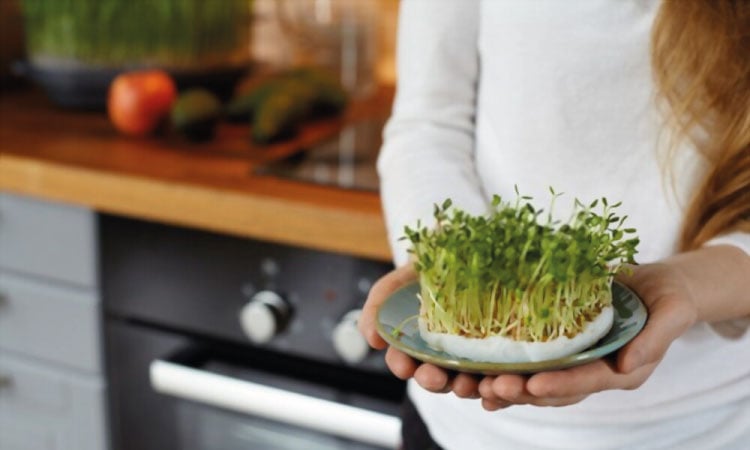Focusing on what to eat during pregnancy is important. It assures that you are eating the right kind of nutrition that helps in the development of the baby. One such thought for many pregnant women is about eating alfalfa during pregnancy. Though many are aware of this, there is much to know like consuming alfalfa sprouts during pregnancy and the benefits and the risks associated.
Nonetheless, moms-to-be try to find the foods that are potentially healthy for them and the fetus during pregnancy, there also exists the doubt of what to eat and what not to. Many moms prefer to avoid medications during pregnancy and look for alternatives or natural ways. Alfalfa is one such natural medicinal herb that is loaded with a powerhouse of nutrients and can be considered as a pregnancy superfood.
Let us give you more insight into this herb and the benefits and risks of alfalfa during pregnancy.
What Is Alfalfa?
Alfalfa is a medicinal herb/plant that is rich in vitamin K, vitamin C, calcium, manganese, and folate. It has been used as a medicinal herb to treat humans for many health conditions. It is a common food for livestock animals. Owing to its health benefits, humans have started to incorporate it as a part of their diet.
Alfalfa leaves, sprouts, and seeds are used for various medical purposes and to treat underlying health conditions. Alfalfa sprouts can be consumed both in cooked and raw form. However, you should be more cautious while incorporating any sprouts during pregnancy, due to the harmful bacteria that could cause ill effects during pregnancy. The seeds and dried leaves of alfalfa are also a good source of energy.
Is Alfalfa Safe During Pregnancy
Pregnant women want to consume whatever is best for themselves and the growing fetus. Since alfalfa is a rich source of calcium, potassium, phosphorus, iron, and vitamins A, C, E, and K, many moms-to-be consider eating alfalfa during pregnancy1. However, consuming alfalfa during pregnancy more than the prescribed limit is not recommended for pregnant women and breastfeeding ladies as alfalfa could act like the estrogen in the body.
Also, the E.coli bacteria present in alfalfa could lead to a lot of complications during pregnancy. Hence, it is recommended to avoid eating raw alfalfa sprouts during pregnancy. The presence of vitamin K is the highest in alfalfa. This means alfalfa during pregnancy helps in clotting of blood and controls bleeding during delivery and hemorrhage.
Also, alfalfa is a good source of amino acids that are highly essential for pregnant women.
Calculate Due Date With LMP
Related Reading: 13 Tips To Enjoy Your Pregnancy And Feel Happy
Is Alfalfa Safe During Nursing?

Consuming alfalfa tea during pregnancy and breastfeeding has a lot of health benefits. It is seen to keep the energy levels high and improve the pregnancy overall. In the olden days, this plant was used by pregnant ladies and nursing moms to support lactation and deal with low milk supply.
It is believed that the plant estrogens known as phytoestrogens are present in alfalfa to help improve milk supply, just like that fenugreek seeds also help to improve breast milk supply2. Consuming alfalfa during pregnancy and breastfeeding will enter the breast milk. Being a rich source of vitamin K, it also helps in the baby’s growth.
However, consuming more alfalfa than the recommended amount could lead to diarrhea in your baby and you.
Are There Any Benefits Of Alfalfa During Pregnancy And Breastfeeding?
Consuming alfalfa has various health benefits and one of them is using it for increasing the milk supply in breastfeeding women. Alfalfa has always been there in the list of good foods to consume and is mostly used as a topping in sandwiches or is found in salads.
Related Reading: Eating Salads During Pregnancy- Importance, Benefits, And Precautions
Alfalfa is considered a superfood as it helps in many phases of pregnancy and breastfeeding. It is rich in vitamins and minerals that are required for women during fertility and lactation. Alfalfa is a nutrient-rich plant, and there are many benefits of alfalfa during pregnancy and breastfeeding that you cannot miss.
Listed below are a few of them.
1. Alfalfa is rich in calcium and vitamins
Being a rich source of calcium, consuming alfalfa during pregnancy strengthens your bone and also aids in the strong bone and muscle development of the fetus. During the breastfeeding stage, consuming alfalfa helps to develop strong teeth for the baby.
Also, it contains a good amount of vitamin K that helps to prepare your body for birth. It also helps to prevent the body from excessive bleeding during and after birth.
2. It is rich in iron and folate
Alfalfa is rich in iron and folate — both of which are essential nutrients for pregnant women. If you do not consume meat, meeting those nutrient requirements could be tough. If you choose to go for natural ways in improving your blood counts and hemoglobin levels, you can consume alfalfa during pregnancy.
3. Alfalfa helps in milk supply
Consuming alfalfa during pregnancy and breastfeeding helps in the proliferation of milk ducts. It also assists in the development of the breast tissues. If you experience a low milk supply, including alfalfa in your diet could increase your supply as well as increase the fat content in your milk.
Prolactin is a hormone responsible for making milk which is segregated based on the instructions from the pituitary gland. Since alfalfa is a source of phytoestrogens, it helps in the lactation process2.
4. Overall health benefits
Alfalfa during pregnancy has been used traditionally to treat many health conditions. It helps to tackle edema and water retention after birth. It also helps in lowering blood sugar, cholesterol, and treating blood pressure.
Related Reading: 8 Ways To Cope With Extreme Food Aversion During Pregnancy
How To Consume Alfalfa During Pregnancy And Breastfeeding?

Alfalfa is nutritionally rich and poses a lot of health benefits. It can be consumed in any form. The leaves, sprouts, and dried forms are all beneficial to health. However, eating raw alfalfa sprouts during pregnancy is not recommended.
If the question: “does alfalfa make you gain weight” is stopping you from consuming this food, the answer is no. The fat binding process in this helps to reduce the fat processed by our metabolism and helps in weight reduction.
Being a rich fiber food, below are ways to consume alfalfa during pregnancy.
- You can grow alfalfa sprouts and add them to salads
- Alfalfa tea during pregnancy can be enjoyed using its leaves. The leaves are usually bitter than the sprouts. Hence, you can use the dried form
- You can also take it in the form of a pill or supplement after consulting your doctor
- Alfalfa seeds and sprouts taste similar to peas. Hence you can add them to soups, salads
- Alfalfa supplements are easily available in the market. You can take them in the form of capsules. You can consult with your doctor before you start taking this supplement
Side Effects Of Using Alfalfa
Alfalfa during pregnancy is considered safe when it is used in moderation. Though there are drawbacks, it is still considered safe due to its medicinal properties and the fact that it has been used for ages. However, anything could have its side effects, and assessing the risks of alfalfa during pregnancy is vital for you and the growing fetus.
Listed below are a few side effects that you must be aware of to reap the complete benefits of alfalfa.
1. Excess intake could cause diarrhea
Diarrhea is one common side effect of excessive consumption of alfalfa due to the intake than the prescribed limit. It is always recommended to follow the levels prescribed by the doctor and slowly increase its level. Start with a small proportion and gradually increase the quantity. In case the baby gets diarrhea, we suggest you stop consuming alfalfa during breastfeeding. You can resume once the baby recovers.
2. Could lead to excess milk supply
Though the increase in milk supply is a good thing, not all moms experience a shortage of milk supply. For moms who consume alfalfa for other reasons such as an increase in energy levels, or calcium enrichment, the production of their milk supply could increase even more. This means you produce more milk leading to significant breast issues such as mastitis and breast engorgement — which becomes painful.
Related Reading: 15 Foods That Make Breast Milk Taste Bad
3. Raw isn’t recommended
Raw alfalfa sprouts and their supplement products come with the threat of foodborne pathogens such as E. coli, salmonella, and listeria. Hence it is advised that pregnant women refrain from consuming raw alfalfa sprouts during pregnancy3.
4. Not recommended for the compromised immune system
There are chances for the sprouts grown in stores to be contaminated leading to multiple bacteria outbreaks. Eating contaminated sprouts could make you sick. According to the Food and Drug Administration (FDA) children, pregnant women, older adults, with a compromised immune system must avoid alfalfa sprouts and supplemental products derived from alfalfa seeds.
Conclusion

Though alfalfa has its own risk of consuming during pregnancy, it does have its benefits which are worth considering as a food to be a part of the pregnancy diet. However, be mindful of the quantity and the conditions in which it is grown.
Being a rich source of antioxidants, vitamin K, copper, folate, and magnesium, this promising food needs to be avoided or taken in moderation by those under blood-thinning medications and with autoimmune disorders.
Now that you know how amazing alfalfa during pregnancy is and how it can boost your milk supply, would you probably try it?

